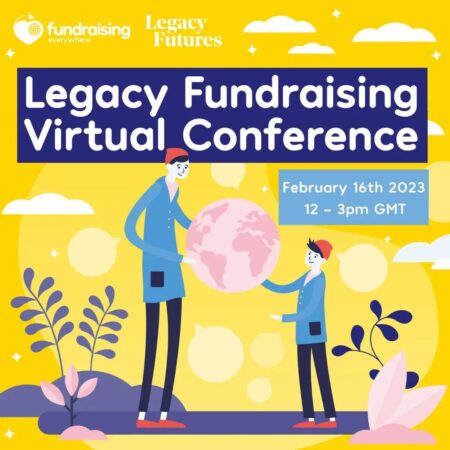Last month, fundraisers from the UK and overseas tuned in to the Legacy Fundraising Virtual Conference organised by Fundraising Everywhere and Legacy Futures.
On the agenda were pertinent topics that matter most to fundraisers, from how to increase your legacy supporters, to the impact the cost-of-living crisis will have on legacy giving, and advice in furthering your legacy career.
We were pleased to welcome over 500 attendees to hear from a host of speakers from charities and related organisations across the sector, including Remember a Charity, UNICEF, Revitalise, Marie Curie and the British Red Cross. In total, 11 sessions were delivered by 17 speakers.
A big thank you to our hosts, Dr Claire Routley and Lena Vizy from our Legacy Futures team, who hosted two virtual rooms in tandem, allowing visitors to choose which talk they attended live, and which they might like to revisit later on-demand.
Talking legacies

Alex McDowell Director of fundraising at Revitalise kicked off the day by addressing the challenge of how fundraisers can best broach the subject of Wills with supporters. Alex shared his first-hand experiences to explain how fundraisers can adjust their language both internally and externally to successfully and confidently place legacies at the heart of their fundraising. He told us that legacy fundraisers shouldn’t be shy about highlighting their successes in the here and now, even though the subject of legacies can be sensitive: “What that individual [the donor] has chosen to do has made a big impact, and we should be celebrating that.”
Advice for furthering your career in the sector

Anaish Yilma-Parmar shared his fascinating and somewhat unusual career journey. Anaish switched careers in his 20s from being a contemporary dancer when he realised he wanted to earn money for good causes and become a fundraising intern. Seven years later and he’s Head of Legacies at the British Red Cross. Anaish spoke about how his internship at Cancer Research UK, where he was nurtured and supported, was the helping step he needed to realise his potential.
But Anaish’s journey wasn’t always smooth, and he experienced rejections along the way. His advice was to “have the confidence to apply for different roles. See how you can stretch your skills. But don’t be put off it if doesn’t happen straight away”. Growing your networks, learning from others and sharing the legacy message so all charities can benefit are, Anaish said, the best ways to achieve a successful career in the sector.
For more information on developing your career in fundraising, take a look at the Chartered Insititute of Fundraising’s career hub, which shares other fundraisers’ stories and provides advice on qualifications and how to find mentors.
A question of ethics


Some of the sessions were co-presented by multiple speakers, taking an informal, conversational form. Persuasion’s Legacy Consultant, Sanita Guddu, and Legacy Futures’ Head of Gifts in Wills Consultancy, Dr Claire Routley, discussed the sensitive yet vital topic of ethics in legacy fundraising and how and why charities should put together an ethics policy to guide their legacy fundraising work.
Sanita reminded us that marketing should always be donor led, and finding out what your donors want is a good basis on which to build an ethics policy. Claire added that an ethics policy is necessary, as it means charities can base important decisions relating to legacy fundraising, such as how to approach it and who to accept gifts from, on sound data rather than on the fly.
Storytelling for legacy fundraising success


Canadian duo Fraser Green, Chief Strategist & Smartypants at Good Works, and Jen Love, Partner at Agents of Good, spoke with sensitive candour about how words matter when it comes to discussing our own and our donors’ mortalities.
Self-confessed ‘word nerd’ Jen advised reframing mindsets, to make conversations be around life rather than death; while Fraser emphasised how the decision to give comes from a heartfelt desire, not a brain-based calculation. Both agreed that the best way to trigger an emotional response, was to make people feel through effective storytelling. Fraser said: “Make people cry, make people feel something. The heart is so much more powerful than the head.”
Innovations in the industry

Lucinda Frostick, Director at Remember a Charity, Juan Mones, Head of Global Fundraising Innovation for UNICEF, and Philip Simmons, Legacy Fundraising Manager at Dogs Trust, came together in an interactive ‘ask the experts’ conversation about recent innovations in legacy fundraising, such as how a new service to ensure dogs’ long-term welfare is helping Dogs Trust open up conversations about legacy giving; and how UNICEF is experimenting with artificial intelligence to devise new ideas for how to reach more potential donors.
Cost-of-living impacting giving

An issue playing on the minds of all legacy fundraisers right now is how the cost-of-living crisis might affect the sector. Luckily, Doug Clow from Legacy Foresight explained, with the use of up to the minute data, what we might expect to see in light of recent and expected inflationary increases in the short and long term.
Changes in the cost of living can alter people’s charitable mindset and their inclination to leave gifts to charities in their Wills. Additionally, Doug pointed out that while rising inflation may lead to greater impact on legacy giving in the long, rather than the short-term, charities still need to keep in mind that their own costs of delivering their work will rise in the short-term and donations from other areas of fundraising may well fall.
Armed with this knowledge, charities can become better prepared for the future and more resilient to changes in donor behaviour. Data such as this empowers charities to reframe their narrative and double down on their efforts to sustain donations for the years ahead.
Legacy fundraising in the arts

We were also delighted to be joined by Marina Jones, Deputy Development Director for English National Opera, who treated visitors to a talk on why supporters made the decision to leave gifts in their Will to art charities. Marina shared real-life case studies in which supporters talked about why they felt such an affinity with a particular arts charity and what inspired them to leave a legacy.
Key to Marina’s session was how legacy fundraisers can maintain relationships with supporters to affirm a lifetime of connection. She explained that “The arts give people emotional and transformative experiences. Their connection with the charity is part of their life and identity”. Being privy to this valuable insight allows the charity to develop their own legacy fundraising strategies, to carefully craft their messaging and re-consider their relationship management approach.
Registration now open for 2024
Thank you to all our speakers who generously shared data, insights and advice. And of course to our participants, for joining us and helping to make legacy fundraising the friendly, inclusive and impactful sector it is.
If you missed this year’s Legacy Fundraising Virtual Conference, don’t worry — you can access this on demand through the Fundraising Everywhere website.
You can also now register for 2024 when another line-up of legacy specialists will be addressing issues facing the sector and offering their guidance on how to navigate them. The 2024 conference will take place on Thursday 15 February.
Details
Thursday 15 February 2024

